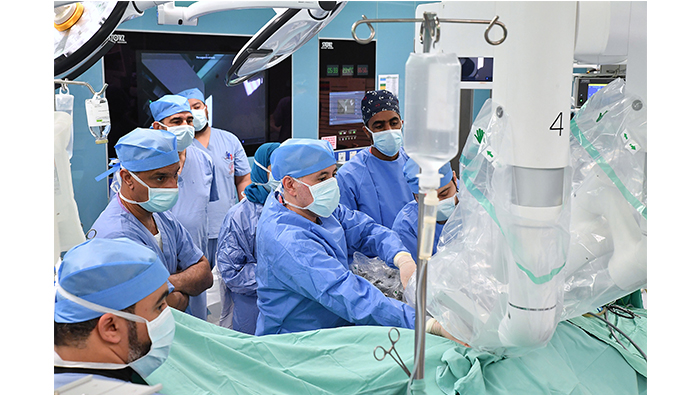
Muscat: The Royal Hospital has successfully performed the first robotic surgery in the Sultanate of Oman, marking a major milestone in the country’s healthcare journey.
This achievement reflects Oman’s forward-looking vision for medical excellence and the adoption of advanced technologies in precision surgery, adding a new chapter to the nation’s evolving healthcare landscape.
Dr. Qais bin Mohammed Al-Hooti, Consultant Urologist at the Royal Hospital, told the Oman News Agency that the procedure involved reconstructive surgery on the renal pelvis for a patient suffering from ureteropelvic junction obstruction.
The operation lasted approximately two hours and was successfully completed.
He explained that robotic surgery represents the pinnacle of precision surgical innovation, offering surgeons unprecedented control, three-dimensional visualization, and the ability to perform highly delicate movements beyond the limits of the human hand.
The system also enables access to deep and complex anatomical areas, reduces incision size and blood loss, accelerates patient recovery, and enhances safety while minimizing complications—ushering in a new era of high-quality, efficient surgery.
The hospital aims to expand the use of robotic surgical technology across multiple specialties, including urology, colorectal surgery, obstetrics and gynecology, hepatobiliary and gastrointestinal surgery, and cardiothoracic procedures.
A key focus is on training and empowering national medical talent to position Oman as a regional leader in robotic and digital surgery.
This achievement aligns with the goals of Oman Vision 2040 to build a pioneering healthcare system rooted in innovation and modern technologies.
It strengthens the national health infrastructure and supports Oman’s aspirations to develop a generation of highly skilled surgeons and technicians proficient in smart surgical techniques, reinforcing the Sultanate’s status as a regional hub for advanced medical care.
The surgical team expressed pride in this landmark accomplishment, noting that robotic surgery offers superior precision and control, reduces postoperative complications, and shortens recovery time compared to traditional methods.
Hospital officials emphasised that this milestone marks the beginning of a new era of smart surgery in Oman. Efforts are underway to expand robotic procedures into other specialties such as colorectal, thoracic, and gynecological surgery, further establishing the Royal Hospital as a national reference center for advanced medicine.
They also highlighted that this success would not have been possible without the continuous support of the Ministry of Health and the collaborative efforts of surgical, medical, and technical teams. It reflects a bold national strategy aimed at enhancing the capabilities of Omani healthcare professionals and equipping them with cutting-edge global technologies.
Robotic surgery is one of the most advanced developments in modern medicine. It relies on intelligent systems operated by surgeons through a sophisticated console that provides magnified, three-dimensional views of the surgical field and enables movements that surpass human dexterity.
This technology significantly reduces blood loss, lowers complication rates, shortens recovery periods, and improves surgical outcomes—especially in complex tumor cases and sensitive anatomical regions.